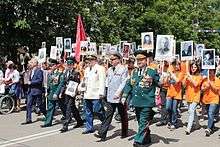Immortal Regiment
The Immortal Regiment (Russian: Бессмертный полк; Bessmertniy Polk) is a massive civil event staged in major cities in Russia and around the world every 9 May during the Victory Day celebrations. It is also a public non-profit organization, created in Russia on a voluntary basis with the aim of "immortalizing" the memory of home front workers, armed forces service personnel, partisans, personnel of resistance organizations, and personnel of law enforcement and emergency services. It involves people carrying on the memory of war veterans, with participants carrying pictures of relatives and/or family friends who served in the country's labor sector, paramilitary units, the Soviet Armed Forces and law enforcement organizations during the Second World War.
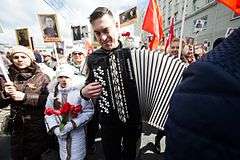 Local residents in Kaliningrad taking part in the Immortal Regiment, carrying portraits of their ancestors who fought in World War II. | |
| Date | 9 May (generally) |
|---|---|
| Duration | 1 day |
| Venue | Central squares and streets |
| Location | Other countries |
| Also known as | Undead Regiment |
| Type | cultural, military |
History
Origins
Even before the name appeared, similar actions were organized in some cities of the USSR. The earliest known was held in 1965, marking the 20th anniversary, when students of Novosibirsk school number 121 walked through the streets of the city with photographs of participants in the war.[1] In 1981, on the Square of the Fighters of the Revolution in Art. A procession of mothers in black robes with portraits of their dead sons (the idea belonged to the director Yulia Sinelnikova) took place in the Rostov Oblast.[2] In the post-Soviet years, similar events took place both in Russia and in a number of other countries. In Jerusalem in 1999, citizens took to the streets portraits of soldiers on Victory Day. In 2007, the Chairman of the Council of Veterans of the Tyumen Region Gennady Ivanov, conceived a parade of citizens holding pictures in a procession[3][4][5], with him gaining the idea of organizing a "Parade of Victors", in which people with portraits of their front-line relatives walked along the main Tyumen street.[6][7] The initiative, at the call of Gennady Ivanov, was taken up by other regions of Russia, and two years later the "Parade of Winners" took place in Kazan, Kemerovo, and about 20 regions.
In 2010, on the initiative of the Deputy Mayor of Moscow Lyudmila Shvetsova, a procession with photographs of veterans first took place in the capital.
Transition from an idea to a global event
First event with this name
In 2011, journalists Sergey Lapenkov, Sergey Kolotovkin and Igor Dmitriev noticed that fewer and fewer veterans took part in street processions on Victory Day. In the spirit of the holiday, they built on this idea and created an official organization. 9 May 2012 became the birth date of the movement in its modern form.[8] A column of city residents passed through the streets of Tomsk, who carried placards with photographs of their relatives who fought in the Great Patriotic War. The rally, called the Immortal Regiment, was attended by more than six thousand people who carried more than two thousand portraits of war participants.[9]
Expansion of the geography of the event (2012-2014)
Since it was conceived in 2007, the initiative has been met with unprecedented support. Coverage in regional and federal Media has led to the popularity of the idea proposed by the creators of the action, has increased dramatically. After May 2012, a community of coordinators from different cities and countries began to take shape around Tomsk. In December 2012, representatives of more than 15 cities of Russia expressed a desire to organize an action. By February 2013, the number of cities had grown to 30[10][11] and was also expanded to four countries (Russia, Ukraine, Kazakhstan, and Israel).[10][12]
Global promotion (since 2015)
Since it was introduced in 2012, it has been conducted in cities such as Moscow, Washington D.C., Dushanbe, Berlin, and Yekaterinburg. By 2015 it had received national status. The Immortal Regiment therefore has become one of the most important elements of the celebrations of Victory Day in Russia. In 2015, the "Immortal Regiment" was held in 1150 settlements of 17 countries[13], and 42 countries in 2016. In 2015, Moscow organizers proposed a march of the Immortal Regiment on the Red Square. To obtain the necessary permission, a corresponding request was sent to the President of the Russian Federation on behalf of three public organizations: the Immortal Regiment - Moscow, the All-Russian Popular Front and the Public Chamber of the Russian Federation. On 9 May 2015, the event took place for the first time on the Red Square, immediately after the 2015 Moscow Victory Day Parade in honor of the 70th anniversary.[14] The intention to participate in the procession was expressed by more than 150 thousand people.[15][16] According to the Moscow Police, more than 50 thousand people took part in it, including Russian President Vladimir Putin. The procession column passed from Belorusskaya Square to the Kremlin and completed the procession on Moskvoretskaya Embankment.[17] The procession cost the state budget about 7,000,000 Russian rubles.[18]
Criticism
Critics, which even include Igor Dmitriev (the founder of the Immortal Regiment)[19], have primarily alleged that the procession is an attempt by the government to promote its own domestic and foreign policies, rather than to honor the memories of the millions who perished in the war.[20] It has also come under criticism by those who charge that many of its participants have carried random photographs and discarded them after the event.[21] The Immortal Regiment campaign gained such popularity that its name became a kind of brand.[22] Gradually, certain points began to indicate an attempt to use it for political PR.
At the end of summer and autumn of 2018, various left-wing forces organized the "Shameful Regiment" marches, on which photographs of prominent political figures who supported raising the retirement age.[23][24] It took place as part of the 2018 Russian pension protests.
Description
The main procession in Moscow usually follows the Moscow Victory Day Parade in the morning, and is a televised event aired all over the world.[25] The front line of the procession carries a banner with the words Bessmertniy Polk written on it.[26] Up to 12 million Russians have participated in the march nationwide in recent years.
There are also a number of local marches following the same procedure in many Russian cities, including regional and republican capitals and major economic hubs.
In Russia
In 2015, the term "Immortal Regiment" was chosen in an analogy to the term "Immortal Barrack" as a neololgism for the Russian Word of the Year.[27] Since 2015, the President Vladimir Putin and senior Russian officials have participated in the procession in Moscow.[21] In 2020, as a result of the COVID-19 pandemic in Russia and the postponement of the 2020 Moscow Victory Day Parade, the Immortal Regiment march, which was supposed to be held on 9 May, was also postponed[28] and was announced to be held Navy Day in a video-conference with President Putin and Minister Sergey Shoygu.[29][30] The reason that was given by President Putin was that "it is impossible to observe any distance by definition" in light of the pandemic.[31] These plans were later scrapped and the march was postponed until 2021.[32][33][34][35] The de facto Immortal Regiment that was held on 9 May took the form of an online webcast, being viewed more than 20 million times.[36] It was the first time something like this was held, with more than 200 media screens throughout Moscow.[37][38]
In other countries
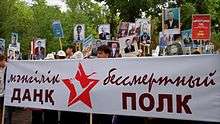
Former USSR






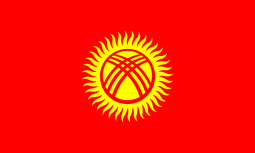


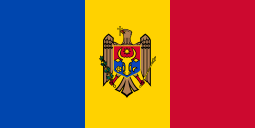
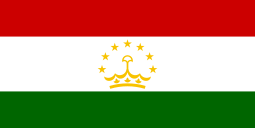
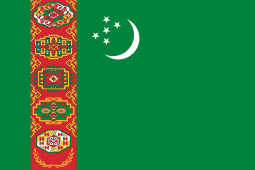

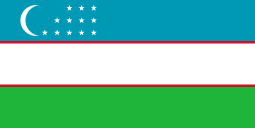
Partly recognized or unrecognized nations
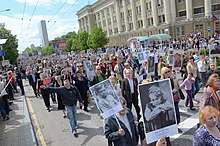
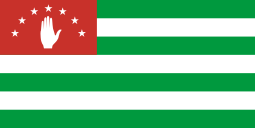
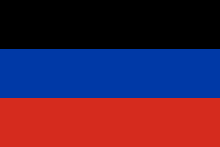

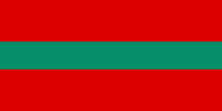
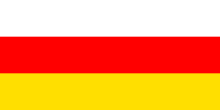
Other nations
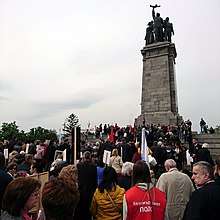
The procession is also done in the following countries:
.svg.png)


.svg.png)

.svg.png)



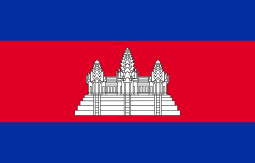
.svg.png)




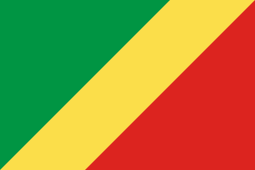
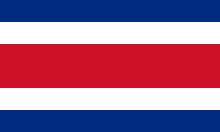












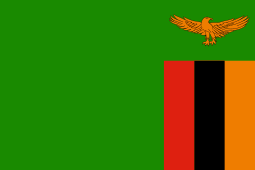










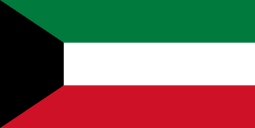

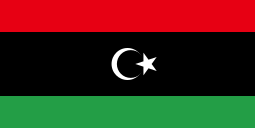

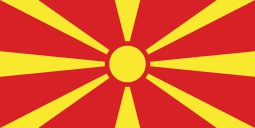




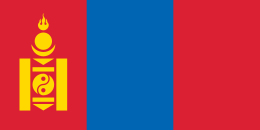
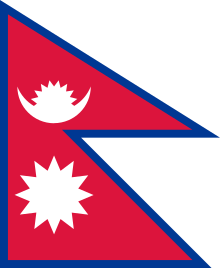




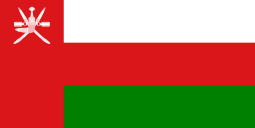
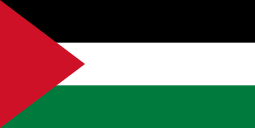




















Many of the traditions and customs in Israel during Victory in Europe Day are the same as in Russia, with Immortal Regiment marches being held in cities with large populations of Red Army veterans and their descendants.
Notable participants
.jpg)
- Vladimir Putin, President of Russia (usually with a portrait of his father, Vladimir Spiridonovich Putin)
- Aleksandar Vučić, President of Serbia (carrying a portrait of Anđelko Vučić, his grandfather)
- Benjamin Netanyahu, Prime Minister of Israel (carrying a portrait of Hero of the Soviet Union Wolf Vilenski, who died in Israel in 1992)[57]
- Sooronbay Jeenbekov, President of Kyrgyzstan (carrying a portrait of his grandfather Jeenbek Pirnazarov)[58]
- Almazbek Atambayev, ex-President of Kyrgyzstan (carrying a portrait of his father Sharshen Atambayev)[59]
- Armen Sarkissian, President of Armenia (carrying a portrait of his personal friend and Soviet intelligence officer Gevork Vartanian)[60]
- Igor Dodon (carrying a portrait of his grandfather George Dodon and his namesake Alexander Dodon)[61]
- Svetlana Toma, Moldovan actress who first debuted at the Moldova-Film.[62]
See also
- Minute of Silence
- Pobediteli
- Time of Remembrance and Reconciliation for Those Who Lost Their Lives during the Second World War
- Victory Day Parades
- International Workers Day
- Salute to America
References
- Акция «Бессмертный полк» родилась 49 лет назад в Новосибирске, а не в Томске // «Академия новостей».
- АиФ- Ростов (2016-08-17). "Бессмертный полк. Впервые портреты фронтовиков пронесли на Дону в 1981-м". www.rostov.aif.ru. Retrieved 2019-04-09.
- Семейный альбом // Тюменские известия, 08.05.2007 г.
- «Колокол Победы» — у «Тюменских известий» // Тюменские известия, 15.10.2015 г.
- Автор идеи «Бессмертного полка»: мне приснилась эта картина шествия // Россия 24, 9.05.2019
- Гришина, Виктория. "«Бессмертный полк» придумал тюменский пенсионер". // Комсомольская правда. 2015-05-11. Retrieved 2015-05-11.
- Рыковцева, Елена. "Сон Геннадия Иванова". Радио «Свобода». 2015-05-13.
- "Томск в мае 2012 года: фотокалендарь городских событий". Сайт Obzor.westsib.ru. 2012-06-05. Retrieved 2015-04-21.
- "Летопись полка". Сайт акции «Бессмертный полк». Retrieved 2015-04-21.
- "9 мая 2013 года. В Бессмертном полку — 150 тысяч человек". Алтапресс. 2013-05-09. Retrieved 2015-04-21.
- "Около 30 городов уже присоединились к томской акции «Бессмертный полк»". 2013-02-13. Retrieved 2015-04-21.
- "В Днепропетровске прошёл «Бессмертный полк»". // obozrevatel.com. 2013-05-09. Retrieved 2015-04-21.
- "«Бессмертный полк» пройдёт в 15 странах и тысяче городов". // ТАСС. 2013-04-09. Retrieved 2015-05-01.
- Акцию «Бессмертный полк» в Москве хотят провести на Красной площади // ИА REGNUM. 30 Марта 2015.
- "Около 150 тыс. человек примут участие в акции «Бессмертный полк — Москва»". // ТАСС. 2015-04-28. Retrieved 2015-05-01.
- Проценко, Любовь. "Более 110 тысяч москвичей записалось на акцию «Бессмертный полк»". // Российская газета. 2015-04-22. Retrieved 2015-04-23.
- Вести-Москва (2015-05-07). "9 Мая по столице пройдёт «Бессмертный полк»". // Вести.Ru. Retrieved 2015-05-07.
- Сайт Госзакупок// http://www.zakupki.gov.ru
- https://www.csmonitor.com/layout/set/amphtml/World/Europe/2016/0509/At-Russia-s-Victory-Day-a-brighter-spotlight-on-USSR-s-immortal-regiment
- https://www.ridl.io/en/how-russia-s-immortal-regiment-was-brought-to-life/#:~:text=The%20Immortal%20Regiment%20is%20often,be%20used%20for%20government%20propaganda.
- "Russia's Immortal Regiment: From Grassroots To 'Quasi-Religious Cult'". www.rferl.org.
- https://www.rferl.org/amp/russia-immortal-regiment-grassroots-to-quasi-religious-cult/28482905.html
- М. Игнатьева (2018-08-27). "«Позорный полк» прошёлся по Комсомольску-на-Амуре". Комсомольская правда. Retrieved 2019-05-05.
- Д. Евстафькв (2018-09-02). "В Екатеринбурге прошел "Позорный полк"". Московский комсомолец. Retrieved 2019-05-05.
- "In pictures: Thousands march for WW2 relatives". May 9, 2016 – via www.bbc.com.
- "Inicio".
- "СЛОВО ГОДА-2015. ИТОГИ ВЫБОРОВ", Mikhail Epstein, December 12, 2015
- "Putin postpones preparations for May 9 parade, Immortal Regiment march". TASS. Retrieved 2020-04-17.
- "Putin Sets Date for Delayed World War II Victory Parade". Voice of America.
- "Meeting with Defence Minister Sergei Shoigu". President of Russia.
- "Russia to hold Victory Day Parade on June 24". eng.may9.ru.
- https://tass.com/society/1180555/amp
- https://thesaxon.org/immortal-regiment-this-year-in-russia-cancelled/15762/amp/
- https://wvua23.com/the-latest-putin-backs-postponing-wwii-commemoration/
- https://tass.com/society/1177129/amp
- "Webcast of the "Iimmortal Regiment Online" viewed over 20 mln times". eng.may9.ru.
- "The "Immortal Regiment Online" campaign is over". eng.may9.ru.
- "Russians invited to join online procession of Immortal Regiment". russkiymir.ru.
- "Armenian Immortal Regiment to hold march on May 9 in Yerevan". armenpress.am. Retrieved 2020-06-08.
- "Thousands mark Soviet Victory Day in Riga". Public Broadcasting of Latvia. 9 May 2015. Retrieved 9 May 2015.
- "Crowds mark Soviet 'Victory Day' in Rīga". Public Broadcasting of Latvia. 9 May 2018. Retrieved 9 May 2018.
- "Moldovan President Igor Dodon Postpones Victory Day Celebrations To August 24 Due To Coronavirus - President". UrduPoint.
- "Marșul Victoriei s-a transferat de pe 9 mai pentru data de 24 august". president.md.
- "Military parade dedicated to Victory Day to be held in Dushanbe' Victor Park on May 9 | Tajikistan News ASIA-Plus". asiaplustj.info.
- "Immortal Regiment procession takes place in Ashgabat | Turkmenistan.ru". www.turkmenistan.ru.
- https://ria.ru/20200509/1571203783.html
- goşun, Milli. "«Baky polk» – gahrymanlarymyza müdimi hatyra". Milli goşun.
- "Nationalists disrupt Victory Day celebrations in Ukraine". www.rt.com.
- https://112.international/politics/poroshenkos-top-quotes-on-victory-day-16718-amp.html
- "В Узбекистане отменили акцию "Бессмертный полк": второй Питер не нужен" (in Russian). Retrieved 2017-05-08.
- https://112.international/politics/victory-day-parade-in-occupied-donetsk-16720.html
- "Жанна Зассеева: буду настаивать на традиционном шествии "Бессмертного полка"". Sputnik Южная Осетия.
- "Beijing Holds First Ever "Immortal Regiment" March". sputniknews.com.
- https://tass.com/society/1003010
- https://nigeria.mid.ru/web/en-nigeria/-/victory-day-celebration-at-the-russian-embassy-in-abuja
- "Immortal Regiment and Marathon of Friendship took place in Cuba for Victory Day". russkiymir.ru.
- правды», Дмитрий СМИРНОВ | Сайт «Комсомольской (May 9, 2018). "Путин вывел Вучича и Нетаньяху на «Бессмертный полк»". KP.RU - сайт «Комсомольской правды».
- "Жээнбеков прошел с портретом деда в рядах «Бессмертного полка» в Бишкеке". rus.azattyk.org.
- КУДРЯВЦЕВА, Татьяна (May 9, 2019). "Экс-президент Алмазбек Атамбаев впервые принял участие в «Бессмертном полку»". 24.kg.
- "Президент Армении принял участие в акции «Бессмертный полк» в Ереване". EADaily.
- "Глава Молдавии принимает участие в онлайн-акции "Бессмертный полк"". ТАСС.
- "Svetlana Toma and Irina Lachina took part in the "Immortal Regiment" activism" (in Russian).
